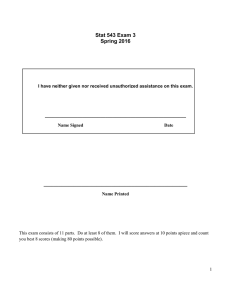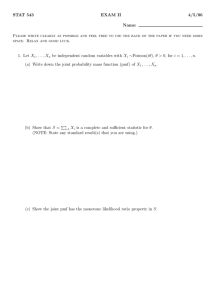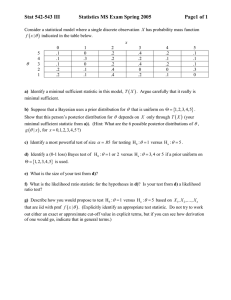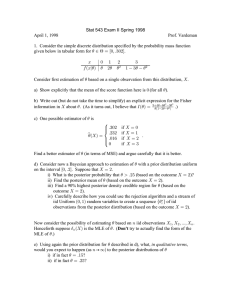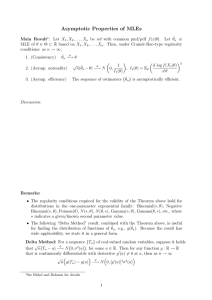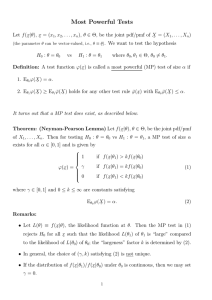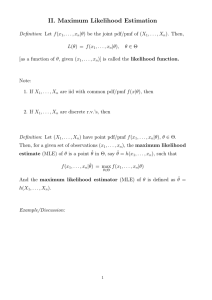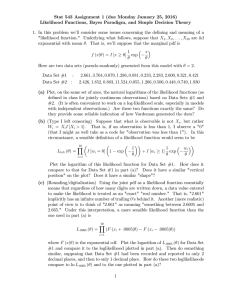Stat 543 Exam 3 Spring 2016
advertisement
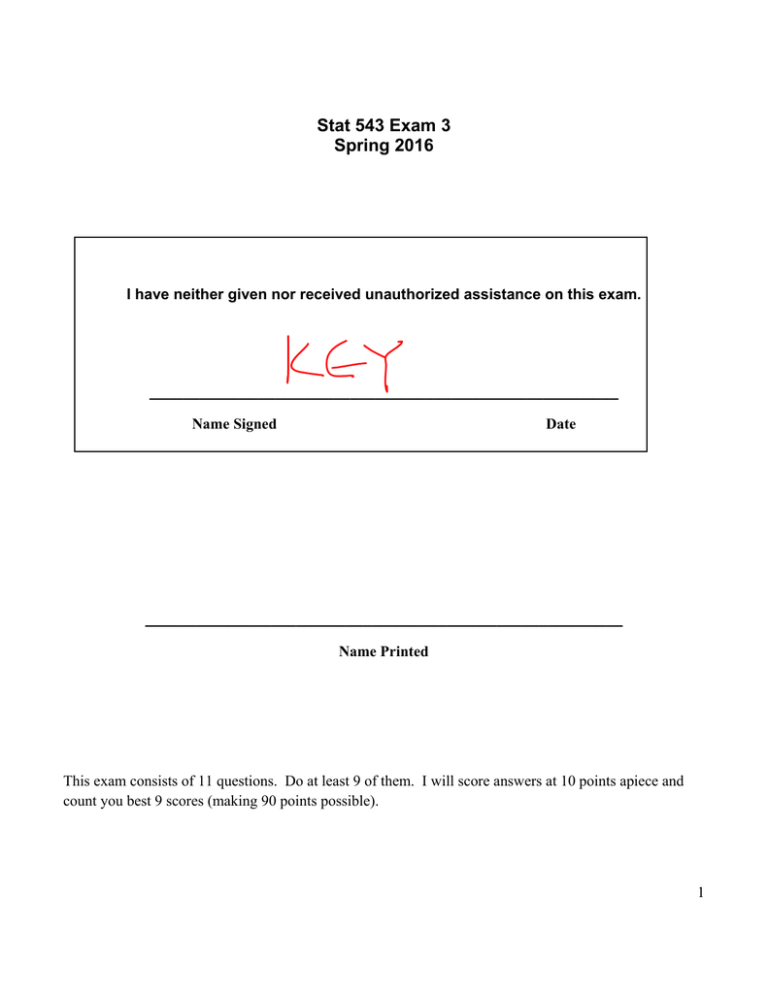
Stat 543 Exam 3
Spring 2016
I have neither given nor received unauthorized assistance on this exam.
________________________________________________________
Name Signed
Date
_________________________________________________________
Name Printed
This exam consists of 11 questions. Do at least 9 of them. I will score answers at 10 points apiece and
count you best 9 scores (making 90 points possible).
1
1. A particular continuous model for random pairs ( X , Y ) with parameter γ ∈ ( 0, ∞ ) has joint pdf
f ( x, y | γ ) =
γ
2π x + y
2
2
(
exp −γ x 2 + y 2
)
∀ ( x, y ) ∈ ℜ 2
(This "radially symmetric" density is constant on circles centered at the origin.)
a) For n iid data pairs ( X 1 , Y1 ) , , ( X n , Yn ) identify a statistic in which there is monotone likelihood
ratio (and show that your statistic really does the job).
b) For the n = 1 case, find the UMP size α = .05 test of H 0 : γ ≤ 1 vs H a : γ > 1 in as explicit a form as is
possible. (You may recall that change of variables to polar coordinates in a double integral involves
replacing dxdy with rdrdθ .)
2
2. Below is a cartoon of a contour plot for a loglikelihood function ln (θ1 , θ 2 ) . Find approximate values
for a maximum likelihood estimate of θ = (θ1 , θ 2 ) and the values of the profile loglikelihood for θ1 ,
ln* (θ1 ) . (The tight contours are at large values of the logliklihood. Presume that the tightest contour is at
−10 and that they fall off at 5 units per contour, so
that they are at −10, −15, −20, .)
θˆ MLE ≈ ________________
Contour loglikelihood values are:
ln* ( 230 ) ≈ __________
ln* ( 240 ) ≈ __________
ln* ( 250 ) ≈ __________
ln* ( 260 ) ≈ __________
ln* ( 270 ) ≈ __________
ln* ( 280 ) ≈ __________
3. A method of moments estimate of a parameter θ is θˆ = 17 . The loglikelihood function, l (θ ) , is
complicated, but it is possible to find (numerical) first and second derivatives l ′ (17 ) = 1 and l ′′ (17 ) = .2 .
Find a correction/improvement on the method of moments estimate based on these derivatives.
3
1 1
4. A loglikelihood for a parameter vector θ = (θ1 , θ 2 ) is approximately quadratic near θˆ MLE = , ,
2 2
ln (θ1 , θ 2 ) ≈ −2θ12 + 2θ1θ 2 − θ 22 + θ1
Based on a large sample approximation to the distribution of a vector MLE, use the Wald method to give
an approximately 95% two-sided confidence interval for θ1 .
5. Suppose that k ( λ ) is the smallest integer k so that for X Poisson ( λ ) , P [ X ≥ k ] ≤ .05 . You may
think of plotting k ( λ ) and producing an increasing step function taking integer values. If I observe a
Poisson variable X , exactly how should I use that step function to produce a confidence interval for λ
with associated confidence at least 95%?
4
6. For parameters 0 < c < 1 and 0 < p < 1 , a pdf on ( 0,1) is of the form
p
c
f ( x | c, p ) =
1 − p
1 − c
for 0 < x < c
for c < x < 1
(The density is constant to the left and then to the right of c , assigning probabilities p = P [ X ≤ c ] and
1 − p = P [ X > c ] .) Find the form of the likelihood ratio statistic for testing H 0 : c = .5 based on n iid
observations from this density, X 1 , , X n . (Assume that n is even.)
5
7. A discrete distribution has pmf
1
2
2 ( 2 p − p ) x = 1, 2
f ( x | p) =
p (1 − p ) x −1 x = 3, 4
Find a 2-dimensional sufficient statistic based on a sample X 1 , X 2 , , X n iid from this distribution, and
say carefully how you know that it is sufficient.
8. For a distribution on {1, 2, , M } specified by values p1 , p2 , , pM , the quantity
M
E ( p ) = − pm ln ( pm )
m =1
is called the "entropy" of the distribution. Using a statistical "information" measure, show that this is no
larger than ln ( M ) (the entropy of the uniform distribution). (In the above expression the convention that
0 ⋅ ln ( 0 ) = 0 is in force.)
6
9. A pmf on the integers with an integer parameter, θ , is
f ( x |θ ) =
1
I [ x = θ − 1 or x = θ + 1]
2
For X 1 and X 2 iid from this distribution, compare MSE's for the two estimators of θ ,
X 1 + 1 if X 1 = X 2
if X 1 ≠ X 2
X
θˆ =
1
and θ =θˆ −
2
1
1
10. Suppose that X U θ − ,θ + and that a prior distribution for θ is N ( 0,1) . Find the Bayes
2
2
estimator of θ under squared error loss.
7
